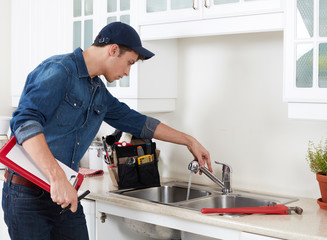Before hiring a home inspector, ask friends and family members for recommendations. Also, compare their prices and online reviews. Home Inspection Colorado Springs is a noninvasive visual examination of a house or condo’s physical structure and systems. It’s a critical step in home-buying that can save you money and hassle later.
 Having a home inspected is vital before putting it on the market, whether you are selling an existing property or building a new one. While some problems are cosmetic, others may indicate severe structural damage and need to be fixed in order for the house to be safe for inhabitants.
Having a home inspected is vital before putting it on the market, whether you are selling an existing property or building a new one. While some problems are cosmetic, others may indicate severe structural damage and need to be fixed in order for the house to be safe for inhabitants.
A home inspector will assess the structure of the building from the foundation up, including walls, ceilings, floors, and other features. They are looking for issues like uneven and bowing walls caused by movements in the foundation, which can be an indicator of severe structural damage. Uneven wall surfaces are often accompanied by cracks and gaps, which can also be signs of severe structural issues.
In some cases, the home inspector will recommend that a professional structural engineer examine the property. This is usually because the damage is extensive and requires a detailed load-bearing assessment, which a professional engineer can provide. If the structural inspection indicates that there are major problems, a professional engineer will typically suggest that a licensed contractor or home inspector conduct further assessments and repairs.
When preparing for a home inspection, homeowners should ensure that all utilities are turned on and that the attic and basement are clear of clutter. This will make it easier for the inspector to access the areas they need to inspect. They should also leave a clear path to the HVAC and furnace so that they can be tested. Providing the home inspector with a clean path will help them provide a more accurate report and will also help them save time and money on the inspection. This will make it possible to complete the inspection and make a sale on the property in a timely manner.
Home inspectors will test light switches and outlets, look at the electrical panel and visible wiring. They’ll be looking to see if there are enough outlets in each room, if the wiring is up to code and whether or not there are GFCI outlets, which help prevent electrical fires in rooms that might come into contact with water (kitchens, bathrooms and laundry rooms). If they see anything out of the ordinary, they’ll flag it. Older homes may have DIY electrical projects that aren’t up to code, and a home inspector will be able to identify these for future buyers.
GFCIs are required by law in any room where electricity might be in contact with water, and if they’re not working correctly it could lead to a dangerous power surge or even a fire. They’ll also look at the sink and bathtub faucets for leaks, check the vents in the ceiling to see if there are any stains or moisture damage, and inspect the pressure relief valve on the water heater for proper operation.
It’s a good idea to attend your inspection so that you can see the inspector at work and ask questions. This will make the whole process go a lot smoother, and you’ll have a better idea of how serious any issues are so that you can bring them up to the seller and ask for them to be fixed before closing.
Of course, a home inspector can’t catch every little problem, and most are not electricians, so they will likely flag any issue that they aren’t qualified to fix and defer to an electrician for further investigation. This is another reason why a pre-listing home inspection is becoming more popular, as it gives you an opportunity to fix any underlying problems before they become deal killers.
Home Inspectors are often called upon to examine plumbing in homes. This includes inspecting fixtures, supply lines and drains in the basement, bathrooms, kitchen, laundry room, water heater, sewage systems, and more. This part of the inspection is critical to ensure a functioning plumbing system and can help prevent future emergencies, such as a burst pipe or a clogged sink.
Most inspectors will also check for signs of water damage in the basement, including musty odors, mildew and mold growth, and damaged floors or walls. This can be caused by a variety of issues, from simple leaks to severe flooding. The home inspector will note these conditions and provide recommendations on how to correct the problem.
A plumbing inspection can be useful for anyone thinking of buying a property. A faulty plumbing system can be very costly, and it is worth investing in an inspection before making a final decision. This will give the buyer an idea of what the cost would be to repair the plumbing, and may even make them reconsider the purchase altogether if the repairs are too expensive.
A home inspection is a limited, noninvasive examination of the condition of a house, usually conducted in connection with the sale of that house. It does not guarantee the future condition, efficiency or safety of the house. It is important to remember that a home inspection should not be confused with a home appraisal, which determines the value of the property. A professional association of home inspectors, such as InterNACHI or the American Society of Home Inspectors, can provide a list of qualified home inspectors in your area. This will help you find an inspector who is competent and has good credentials.
Many homeowners don’t make it a habit of going into their attic, but that is one of the places that home inspectors go to during a home inspection. There are several things that an inspector will be looking for in the attic, including water damage, insulation, and even the structural integrity of the roof.
An inspector will look at the attic for signs of moisture, mold, and rot. Moisture can lead to wood rot and rust on metal fixtures. It can also cause mold and mildew which can be unhealthy for occupants. In addition, excessive moisture in the attic can cause damage to the rafters and ceiling below it, leading to expensive repairs.
Insulation in the attic is a big deal. It helps to lower energy bills because it keeps the house cool in the summer and warm in the winter. If there is not enough insulation in the attic, it will be noticeable on the house’s energy bills.
A home inspector will also check the attic framing and roof sheathing to see if it is sturdy. This will help determine if the framing is adequate to support the roof and protect the house from high winds.
An inspector will also examine the electrical system in the attic. This will include checking the main service panel, power outlets, branch circuit wiring and light fixture circuit wiring. The inspector will not open any panels or dismantle any devices, but he or she will observe their condition and operation. The inspector will also be looking for grounding, GFCIs and the compatibility of amperage and voltage ratings. In addition, he or she will be looking for the presence of aluminum branch circuit wiring.
Many home inspectors will find it a challenge to inspect crawl spaces, especially if they are un-insulated or covered by other storage. However, a well-equipped and experienced home inspector will make every reasonable attempt to gain access while communicating with the client. If a space is completely inaccessible then it should be saved for a later inspection and the client should be informed of this.
Regardless of whether a crawl space is insulated, it should be properly ventilated to control humidity. This helps to prevent wood rot, mold growth and fungus. It’s also a good idea to use a dehumidifier in the crawl space and to replace any insulation that has been damaged over time. This helps to reduce energy costs by preventing heat loss through the floor and ceiling.
Some of the most common issues found in crawl spaces include water damage, sagging floors, contaminated insulation, mold growth and rodent activity (which can lead to significant structural damage). Inspectors should be looking for signs of moisture on the soil/floor/vapor barrier, potential mold growth, rotting of joists/beams, efflorescence, and rust staining of furnace, water heaters or steel structural components.
A professional home inspector can identify these problems early and prevent costly repairs in the future. This is a major reason why real estate agents often require a home inspection prior to selling a property. A crawl space inspection can help homeowners understand how much repair work will be needed and allow them to negotiate a price that takes this into account. Also, if an inspector finds significant problems that will be expensive to repair, they can recommend the homeowner address these issues before closing on the property. This can save both parties a great deal of time and money.
